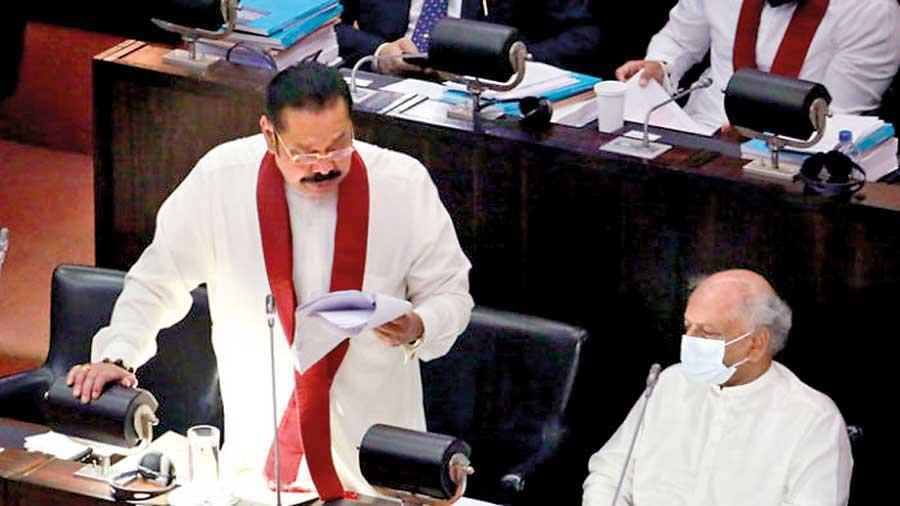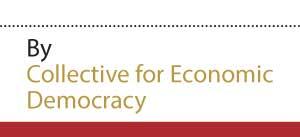Reply To:
Name - Reply Comment
Last Updated : 2024-04-18 12:54:00

- Sri Lanka is going through an economic depression. Anyone who does not recognize this will not be able to come up with solution
- Will Sri Lanka end up becoming further enmeshed in geopolitical power plays that restrict its room for manoeuvre?
Budget 2021 does not meet the scale of the challenges Sri Lanka is going to face in the coming years. Instead of  offering a realistic, concrete alternative to the current situation, we are in, the budget draws from the platitudes of a “vistas of prosperity and splendour” policy document reflecting the exuberance of a pre-crisis era. The reality is that Sri Lankans are suffering now, and they need a massive response both to deal with the short-term and long-term consequences of the COVID-19 pandemic and the unravelling economic crisis.
offering a realistic, concrete alternative to the current situation, we are in, the budget draws from the platitudes of a “vistas of prosperity and splendour” policy document reflecting the exuberance of a pre-crisis era. The reality is that Sri Lankans are suffering now, and they need a massive response both to deal with the short-term and long-term consequences of the COVID-19 pandemic and the unravelling economic crisis.
The latter will not disappear, despite the Government’s desperate attempts to stick to the line that Sri Lanka is on the verge of becoming a technological, knowledge and financial hub. Hence Budget 2021 ignores the urgent needs and longer-term sustenance of society and has instead proposals for technological, marketable higher education and other infrastructure projects that are characteristic of the flawed policies over the last decade. The disastrous consequences of this denial are very real. On the domestic front, the Budget’s failings hinge on two issues: 1) its lack of revenue-raising measures and 2) the lack of stimulus and public spending.
Sri Lanka is facing a severe fiscal crunch. In the context of a shrinking economy, state revenues cannot be raised in the usual manner; even though that has also been unjust with a regressive tax policy of over 80% in indirect taxes, where ordinary people are taxed while the wealthy pay very little. During any year hit by an economic depression, incomes across the board are going to fall, consumption is going to greatly reduce and even profits fall, reducing the tax revenues from incomes and consumption during that year. It is in this context, that even the guardian of global capital, the IMF has proposed wealth and property taxes as a possible solution for developing countries that are likely to have trouble raising revenues during this economic crisis, which it believes is the worst downturn since the Great Depression of the 1930s. Governments around the world, though, are afraid to alienate their elite constituencies and their short-term interests, even though inaction in terms of raising revenues and a powerful stimulus by the Government will eventually undermine capitalist interests and growth itself, as during the Great Depression. Sadly, the Sri Lankan Government is proposing even more tax concessions for businesses across the board in the hope of stimulating private investment; rather than prioritizing the desperate need to raise capital for the state to invest and restructure the economy to focus on critical needs such as food security.
The latter is necessary to sustain and develop the food system, which has been debilitated by the disruptions by the pandemic and economic crisis. The Government’s myopia reflects a long-discredited view that if businesses simply pay less in tax, they will invest more. In the case of the Sri Lankan economy, especially now that it is contracting, it is foolhardy to expect that private investment will increase when the opportunities are so few and meagre.
"Given the severity of the crisis, we do not see the proposed budget deficit of 9% as a worry, rather we are concerned that the unattainable revenue targets, even the proposed low target of 11.5% of GDP, may lead to further cuts in state expenditure"
The proposals presented in Budget 2021 and the opposition’s response sticking to the economic orthodoxy of reducing budget deficits and opposition to import-substitution are extremely disappointing. Given the severity of the crisis, we do not see the proposed budget deficit of 9% as a worry, rather we are concerned that the unattainable revenue targets, even the proposed low target of 11.5% of GDP, may lead to further cuts in state expenditure. Furthermore, import-substitution is a much-needed shift in vision now, but the Budget lacks any realistic proposals including the mobilization of resources and investment in local industries that could achieve the targets of national production. Both the Government and the opposition should be pushing for immediate economic relief for people and government investment in sectors prioritizing human and social development to stimulate employment. This will increase the budget deficit, but will also manifest in real gains over time. Besides, this requires putting forward redistributive revenue proposals that meet the long-term need to build a sustainable fiscal basis for the economy.
The working people, many of whom have seen their income streams completely dry up, are the first to experience the pain of the depression right now. The Government has proposed ridiculous, measly relief measures for narrow segments of society, such as Rs. 2 on the dollar of every migrant worker earned, and the use of Samurdhi funds for loans. Even long-overdue measures such as increasing plantation workers’ wages will not mean much if people are losing their jobs en masse. The need for a comprehensive system of social security and unemployment benefits are extremely clear. Yet Budget 2021 does not address these issues. The stunning lack of universal, regular relief payments means that the Government right now is simply choosing to downplay or otherwise ignore working people’s economic suffering.
"People’s hopes and expectations may be dulled because of the pandemic. But over time, economic suffering will create further resentments. This could create space for openly fascistic actors to take advantage. Why does the Sri Lankan Government appear impervious to this reality? The fundamental flaw is in its analysis"
For both moral and strategic reasons, this is a disastrous approach. Economically, the decline in aggregate demand will put even more pressure on businesses. When people cannot consume, businesses do not get paid, and the entire economy shrinks even more. Moreover, politically, increasing working people’s suffering by choosing austerity by default is dangerous. The current regime, still working from the perspective of its election victories, may see the situation differently. But across the world, some governments are dealing with the fallout of the pandemic in more productive ways than others. There is a massive amount of social pressure to provide basic incomes and finance people-centred public works projects that can get the economy back on track. The governments that choose to ignore or deflect people’s immediate needs are taking a huge risk. People’s hopes and expectations may be dulled because of the pandemic. But over time, economic suffering will create further resentments. This could create space for openly fascistic actors to take advantage.
Why does the Sri Lankan Government appear impervious to this reality? The fundamental flaw is in its analysis. Sri Lanka is going through an economic depression. Anyone who does not explicitly recognize this fact will not be able to come up with solutions that are adequate to the massive scale of the crisis. The Government may act as if this is a one-off, temporary issue because of COVID-19, a mere stumbling block to its “vistas of prosperity and splendour.” But if it does not fix its vision soon, it may end up falling off the economic cliff.
"The Government’s myopia reflects a long-discredited view that if businesses simply pay less in tax, they will invest more. In the case of the Sri Lankan economy, especially now that it is contracting, it is foolhardy to expect that private investment will increase when the opportunities are so few and meagre"
We cannot afford to walk into this disaster. The people must know that Sri Lanka’s crisis, though part of a global wave, has credible domestic solutions that the Government currently is choosing to ignore.
The follow-up question is, will Sri Lanka, historically trapped in global relations of dependency, end up becoming further enmeshed in geopolitical power plays that restrict its room for manoeuvre as the crisis wears on?
We will in the days ahead address how Sri Lanka’s crisis relates to the tremendous changes underway in the global political economy.
The Collective for Economic Democracy consists of academics, researchers and activists involved in analyzing the political economy of Sri Lanka with a social justice perspective.

Add comment
Comments will be edited (grammar, spelling and slang) and authorized at the discretion of Daily Mirror online. The website also has the right not to publish selected comments.
Reply To:
Name - Reply Comment
On March 26, a couple arriving from Thailand was arrested with 88 live animal
According to villagers from Naula-Moragolla out of 105 families 80 can afford
Is the situation in Sri Lanka so grim that locals harbour hope that they coul
A recent post on social media revealed that three purple-faced langurs near t

10 Apr 2024
09 Apr 2024